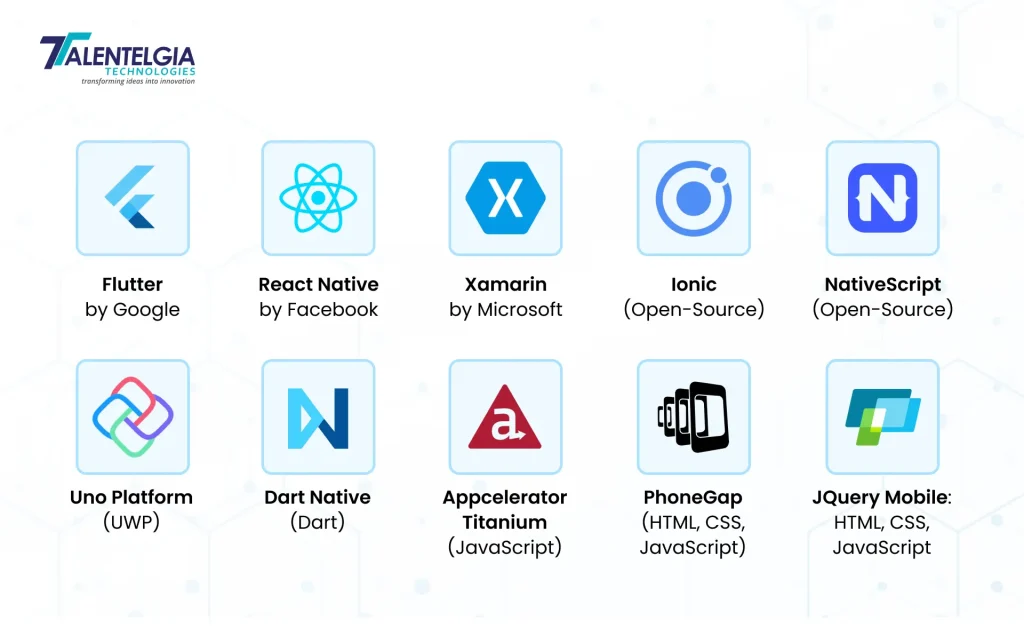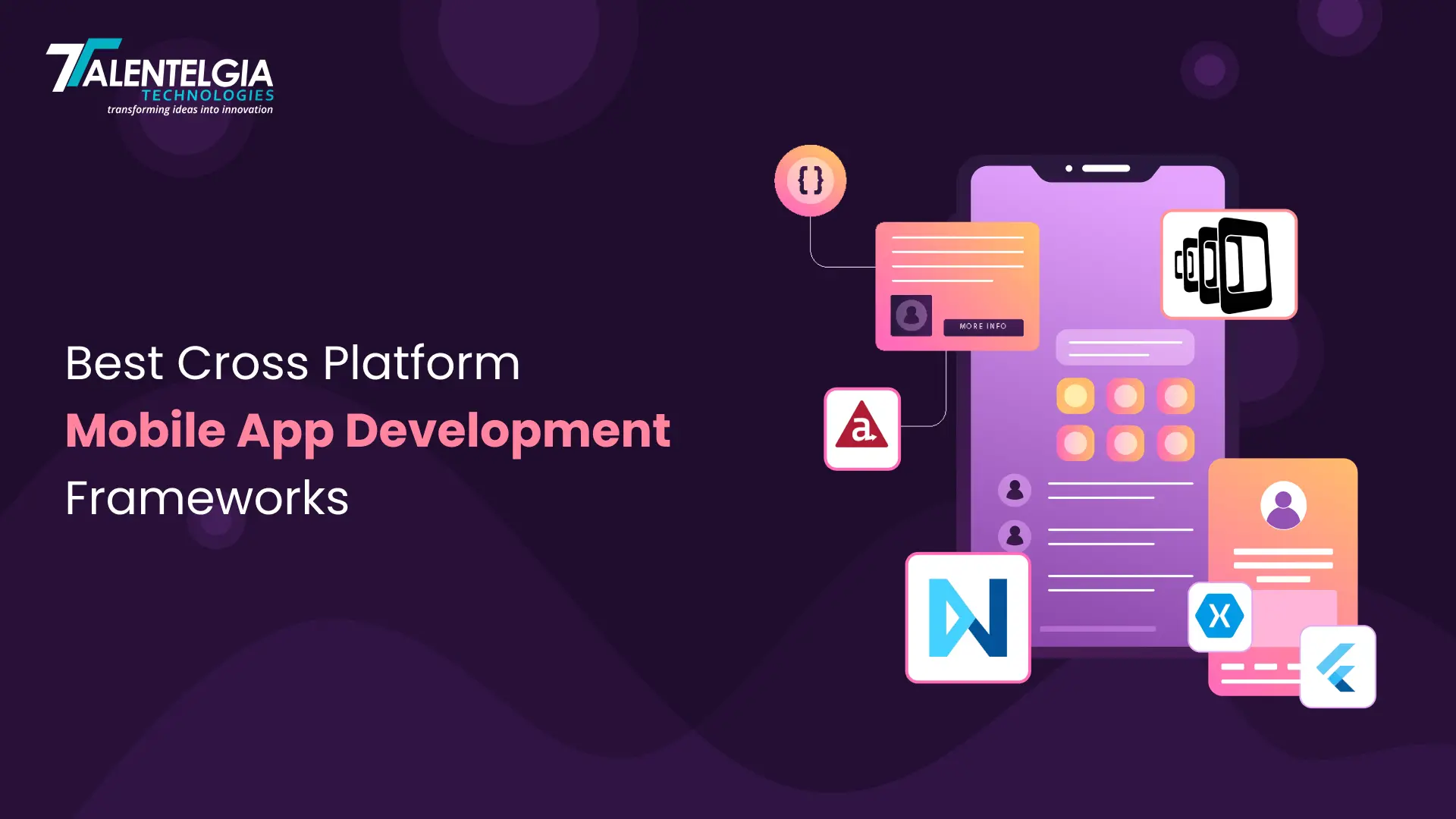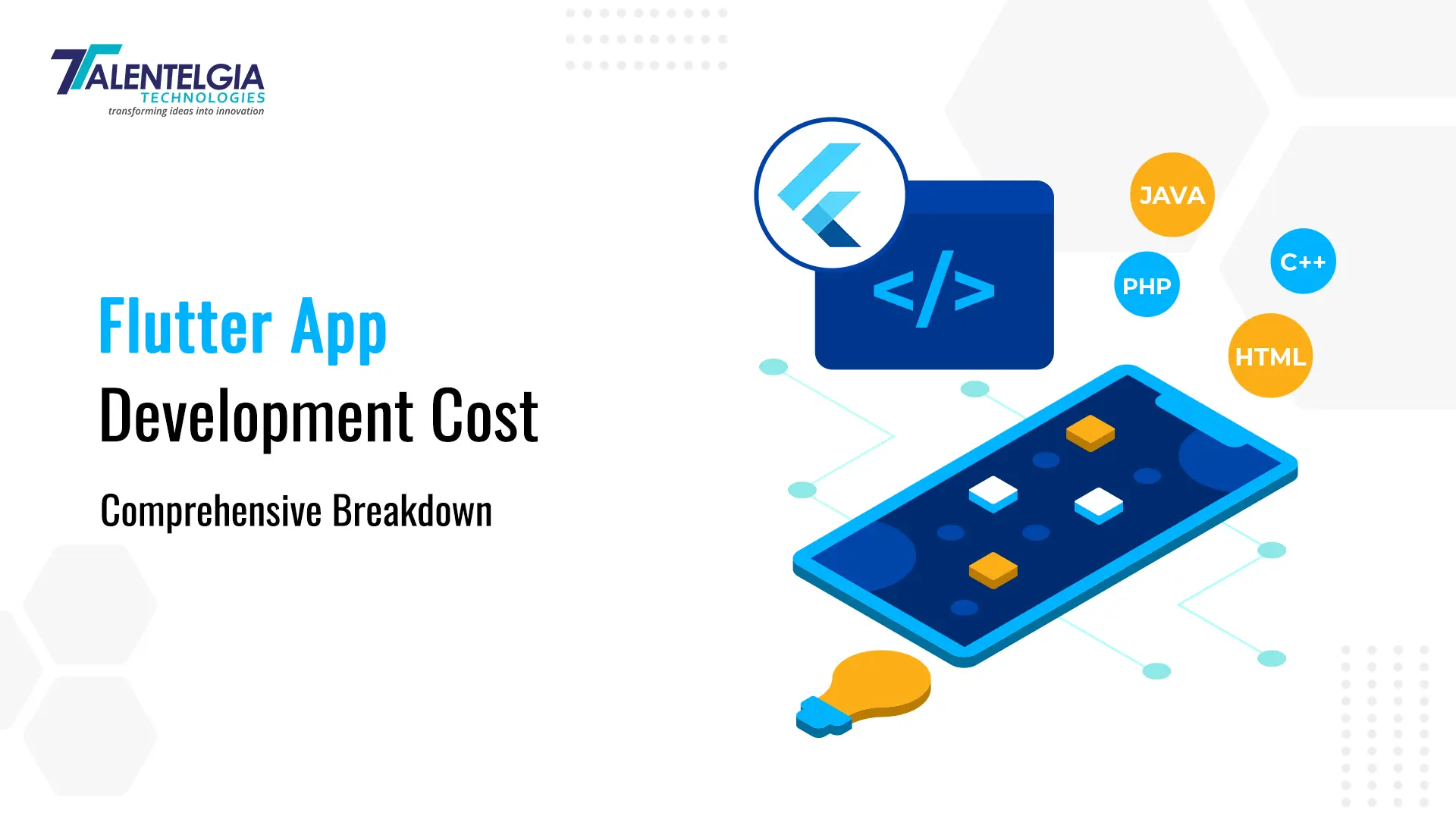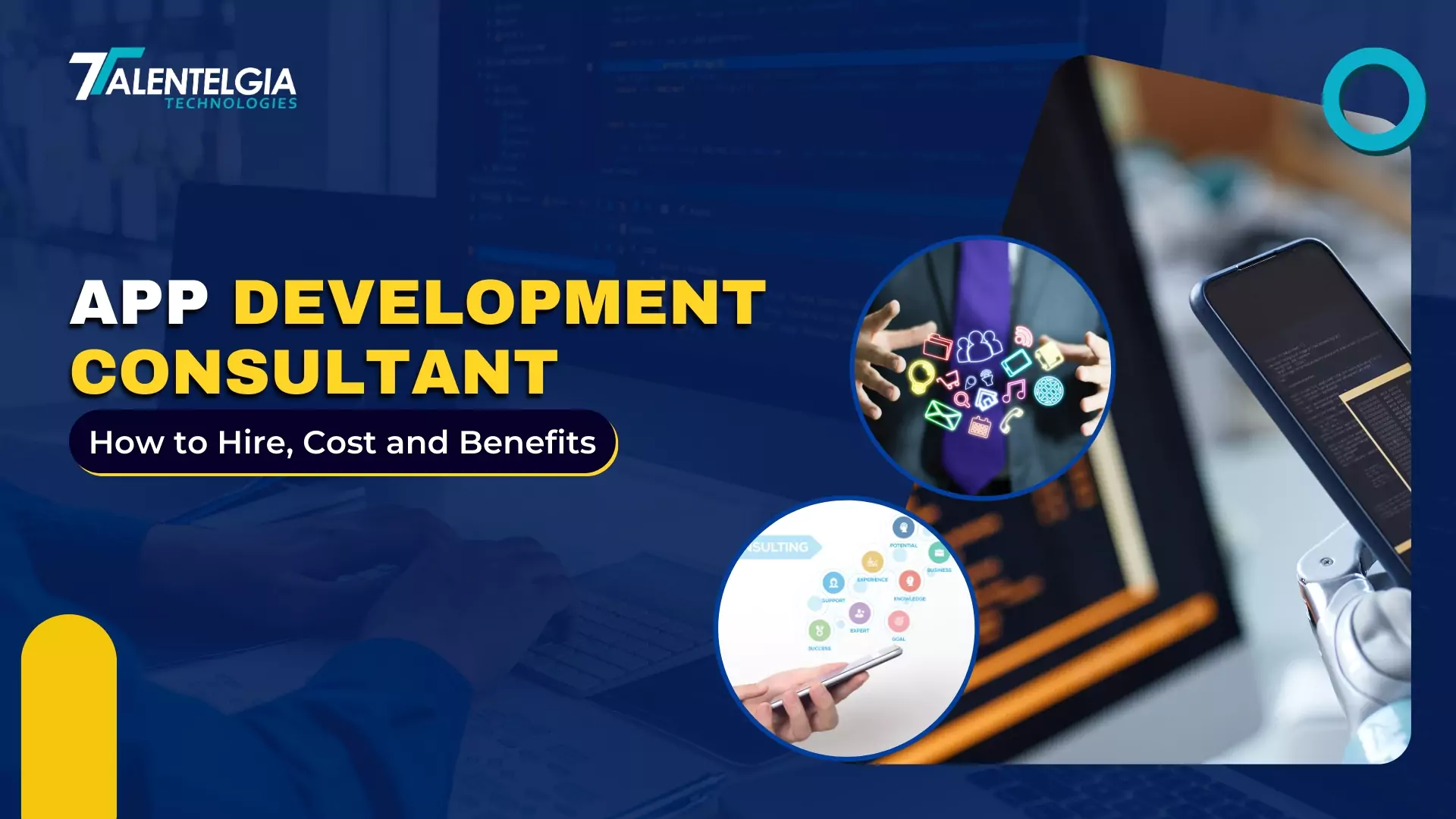Businesses are now looking for high-performing, cost-effective solutions to stand out in the market. This has increased the demand for cross-platform frameworks.
Frameworks are the perfect choice for the dynamic market as they help developers build applications that are compatible with multiple operating systems, like iOS or Android. However, the large number of cross-platform mobile app development frameworks can make the choice tough.
However, it is important to choose the best cross-platform mobile app development framework to build a functional mobile app. Here are some of the frameworks you can choose from:
Please create an image with brand icons of the following:

1. Flutter by Google
Flutter is a framework by Google that quickly drew attention due to its unique approach.
It follows object-oriented programming features (OOPS) which is easy to learn and use. Its uniqueness consists of directly rendering UI elements into the platform’s native controls to assure high performance and a consistent user experience across different devices and operating systems. With its “hot reload” functionality, Flutter can allow developers to instantly see changes, accelerating the development process and improving productivity.
One of the great advantages of Flutter is the extensive widget library that allows a flutter app development company to build beautiful, interactive interfaces. In addition to this, its rich ecosystem of plugins and packages provides easy integrations with third-party services and libraries.
Performance is one of Flutter’s core features, making it a good choice for developers who uphold user experience and cross-platform compatibility.
2. React Native by Facebook
React Native by Facebook utilizes JavaScript and React to build native applications. It has good runtime performance. Component-based React Native design promotes reusability and maintainability while constructing complex applications.
Developers with experience working in React can immediately start working with React Native and develop cross-platform applications. Moreover, React Native has one of the largest communities. So, there is a lot available in terms of resources, tutorials, and other kinds of support that can help a person learn to use this framework in a much easier manner.
React Native app development framework is ideal for those who want a performance-focused alternative for Cross-platform apps. Based on JavaScript, React Native appeals to many web developers.
3. Xamarin by Microsoft
Xamarin, by Microsoft, employs C# and the .NET framework in developing cross-platform apps. It offers the broadest set of tools and libraries, thereby recommending itself for large-scale enterprise applications. Code sharing between platforms might be extremely effective in terms of time and money when it comes to Xamarin.
One of the main benefits of Xamarin is the reuse of existing knowledge and experience in .NET. The programmers with previous experience in C# and .NET can easily switch to Xamarin. Moreover, Xamarin has a really wide ecosystem of tools and libraries that ease integration with other .NET technologies and services.
Also, its enterprise-level development priority and code sharing across platforms make Xamarin very popular for large-scale mobile cross-platform application design with complexity in organizations.
4. Ionic (Open-Source)
Ionic is based on the Angular or Vue.js frameworks- concentrates on the presentation layer and helps developers create appealing apps. The hybrid architecture of Ionic combines web technologies with native ones.
Such an approach enables finding a balance between performance and development speed. Though Ionic can’t provide native performance, like Flutter or React Native, this technology is good for projects that need rapid development and cross-platform compatibility.
Key advantages of using Ionic include a focus on rapid development and its ease for a developer who has experience with web development technologies. Secondly, Ionic provides a set of pre-built UI components and themes that can easily be adapted to develop interactive interfaces. Besides, Ionic’s hybrid approach balances performance with development speed. This is suitable for projects that do not need high-end performance levels.
Ionic focuses on rapid development and visual appeal in developing applications. Hence, it is among the most used by organizations to get their apps out into the market within the shortest time possible.
5. NativeScript (Open-Source)
NativeScript is another open-source framework, using JavaScript, with Angular or Vue.js. Unlike Ionic, it uses native APIs, so it offers a more native-like feel but may experience delays in UI updates. NativeScript is more performing, compared to the others. It’s just like a native app, making it fit for performance-critical applications. However, it has a steeper learning curve since developers must have experience in native development.
But NativeScript uses direct native API access, so the performance and integration with native features are better. A lot of third-party components and a large community also mean that this framework has significant resources and support, making it easier to learn and work with. The performance focus and native-like experience of NativeScript make it famous among developers.
6. Uno Platform (UWP)
Uno Platform represents the powerful cross-platform framework, extending UWP (Universal Windows Platform). This allows developers to provide applications executable on iOS, Android, WebAssembly, macOS, and Linux. With the strong feature of UWP, Uno Platform offers a single codebase with consistent user experience and performance.
Uno Platform presents certain advantages, such as code reuse on different platforms that reduce development time and effort. You can write once and deploy to multiple targets; that assures consistency and minimizes the possibility of errors. Also, Uno Platform provides a rich set of UI controls and components, making it easy to create an appealing and interactive application.
Uno Platform might be more difficult to learn than the competition for developers unfamiliar with UWP, but code reusability and performance advantages can make it well worth investing in by companies needing to hit multiple platforms.
7. Dart Native (Dart)
Dart Native is a relatively new cross platform app development framework focused on high-performance and native-like UI. It employs the Dart language, which is generally known for its speed and efficiency. Dart Native offers a single codebase approach, which means a developer can target multiple platforms using a single codebase.
Performance is one of the key benefits of using Dart Native. It is designed for high-performance applications, native to the platform. Besides, Dart Native offers a rich set of UI components with great tools that make developing interactive interfaces easy.
The performance focus of this platform makes it interesting for developers looking for speed and efficiency.
8. Appcelerator Titanium (JavaScript)
Appcelerator Titanium is one of the older frameworks; it can rapidly develop using JavaScript. It supports a wide range of platforms that include iOS, Android, Windows, macOS, and Linux. It has a huge, active community where users find help and support whenever needed.
One of the major benefits of Titanium is that it accelerates development. It provides tools and features that make the development of cross-platform apps easier. Besides, it has a great community that comes loaded with several resources, tutorials, and support, making it quite easy to learn and use.
While it may not be able to compete with many of the newer frameworks in terms of performance, Titanium focuses on rapid development, and its very large community makes it a good option for organizations that need to bring their apps to market as quickly as possible.
9. PhoneGap (HTML, CSS, JavaScript)
PhoneGap is a hybrid framework that uses web technologies like HTML, CSS, and JavaScript and creates cross-platform apps out of them. While it’s not as good as the newer options, PhoneGap still maintains an incredibly active community and is a good choice for some projects.
The benefits of using PhoneGap are that it is fairly easy to adopt for developers already experienced in web development. It also offers a familiar environment and lets the developer reuse their previous skills for cross-platform application development. Further, the hybrid approach of PhoneGap will be good in projects where web-based features are required or integrating an existing web application.
PhoneGap might not give the level of native performance compared to other frameworks because those have direct access to the native API, the simplicity and ease of use make it fit for projects whose priority is in rapid development combined with web technology compatibility.
10. JQuery Mobile: HTML, CSS, JavaScript
jQuery Mobile is the lightest cross app development framework; it’s easier for users, making cross-platform mobile applications development easier. It offers an easy way of building responsive and visually appealing interfaces.
It has pre-set UI components and themes that are easily adaptable to make visually appealing and interactive interfaces. Besides, JQuery Mobile is very well supported by a huge community of developers in whom ample resources and support are available.
jQuery Mobile might not be as slick or flexible as some of the newer tools, but for developers wanting to create an application that can be easily ported across multiple platforms with the least amount of headache and trouble, its relative simplicity and lightness can be a huge plus!
Choosing the Right Framework: Considerations for Success
Which cross-platform framework will be appropriate for your project depends on specific needs that include the team’s capability, and your long-term objectives. Therefore, weighing strengths and weaknesses carefully will let you make informed decisions while developing successful cross-platform applications. However, when selecting a cross-platform framework, focus on aspects like:
- Learning Curve: How steep is the learning curve concerning the developers learning the framework?
- Performance: How well does this framework support various devices and platforms?
- Community and Ecosystem: Is there a large and active community around it to help out and support, even resource development?
- Features: Does it provide the features and functionality you need to develop your app?
- Cost: Is it free or would licensing be needed?
Conclusion
Cross platform app development also has an array of options, and each has its strengths and weaknesses. Thus, based on the detailed analysis of the specific demands of your project and keeping in mind everything discussed above, you will be able to make a selection among the best options to suit your needs. Remember, the modern world is continuously changing every second, and new trends and technologies are emerging. Keep yourself updated to help your app stay fresh for its users.


 Healthcare App Development Services
Healthcare App Development Services
 Real Estate Web Development Services
Real Estate Web Development Services
 E-Commerce App Development Services
E-Commerce App Development Services E-Commerce Web Development Services
E-Commerce Web Development Services Blockchain E-commerce Development Company
Blockchain E-commerce Development Company
 Fintech App Development Services
Fintech App Development Services Fintech Web Development
Fintech Web Development Blockchain Fintech Development Company
Blockchain Fintech Development Company
 E-Learning App Development Services
E-Learning App Development Services
 Restaurant App Development Company
Restaurant App Development Company
 Mobile Game Development Company
Mobile Game Development Company
 Travel App Development Company
Travel App Development Company
 Automotive Web Design
Automotive Web Design
 AI Traffic Management System
AI Traffic Management System
 AI Inventory Management Software
AI Inventory Management Software
 AI Software Development
AI Software Development  AI Development Company
AI Development Company  AI App Development Services
AI App Development Services  ChatGPT integration services
ChatGPT integration services  AI Integration Services
AI Integration Services  Generative AI Development Services
Generative AI Development Services  Natural Language Processing Company
Natural Language Processing Company Machine Learning Development
Machine Learning Development  Machine learning consulting services
Machine learning consulting services  Blockchain Development
Blockchain Development  Blockchain Software Development
Blockchain Software Development  Smart Contract Development Company
Smart Contract Development Company  NFT Marketplace Development Services
NFT Marketplace Development Services  Asset Tokenization Company
Asset Tokenization Company DeFi Wallet Development Company
DeFi Wallet Development Company Mobile App Development
Mobile App Development  IOS App Development
IOS App Development  Android App Development
Android App Development  Cross-Platform App Development
Cross-Platform App Development  Augmented Reality (AR) App Development
Augmented Reality (AR) App Development  Virtual Reality (VR) App Development
Virtual Reality (VR) App Development  Web App Development
Web App Development  SaaS App Development
SaaS App Development Flutter
Flutter  React Native
React Native  Swift (IOS)
Swift (IOS)  Kotlin (Android)
Kotlin (Android)  Mean Stack Development
Mean Stack Development  AngularJS Development
AngularJS Development  MongoDB Development
MongoDB Development  Nodejs Development
Nodejs Development  Database Development
Database Development Ruby on Rails Development
Ruby on Rails Development Expressjs Development
Expressjs Development  Full Stack Development
Full Stack Development  Web Development Services
Web Development Services  Laravel Development
Laravel Development  LAMP Development
LAMP Development  Custom PHP Development
Custom PHP Development  .Net Development
.Net Development  User Experience Design Services
User Experience Design Services  User Interface Design Services
User Interface Design Services  Automated Testing
Automated Testing  Manual Testing
Manual Testing  Digital Marketing Services
Digital Marketing Services 
 Ride-Sharing And Taxi Services
Ride-Sharing And Taxi Services Food Delivery Services
Food Delivery Services Grocery Delivery Services
Grocery Delivery Services Transportation And Logistics
Transportation And Logistics Car Wash App
Car Wash App Home Services App
Home Services App ERP Development Services
ERP Development Services CMS Development Services
CMS Development Services LMS Development
LMS Development CRM Development
CRM Development DevOps Development Services
DevOps Development Services AI Business Solutions
AI Business Solutions AI Cloud Solutions
AI Cloud Solutions AI Chatbot Development
AI Chatbot Development API Development
API Development Blockchain Product Development
Blockchain Product Development Cryptocurrency Wallet Development
Cryptocurrency Wallet Development About Talentelgia
About Talentelgia  Our Team
Our Team  Our Culture
Our Culture 
 Healthcare App Development Services
Healthcare App Development Services Real Estate Web Development Services
Real Estate Web Development Services E-Commerce App Development Services
E-Commerce App Development Services E-Commerce Web Development Services
E-Commerce Web Development Services Blockchain E-commerce
Development Company
Blockchain E-commerce
Development Company Fintech App Development Services
Fintech App Development Services Finance Web Development
Finance Web Development Blockchain Fintech
Development Company
Blockchain Fintech
Development Company E-Learning App Development Services
E-Learning App Development Services Restaurant App Development Company
Restaurant App Development Company Mobile Game Development Company
Mobile Game Development Company Travel App Development Company
Travel App Development Company Automotive Web Design
Automotive Web Design AI Traffic Management System
AI Traffic Management System AI Inventory Management Software
AI Inventory Management Software AI Software Development
AI Software Development AI Development Company
AI Development Company ChatGPT integration services
ChatGPT integration services AI Integration Services
AI Integration Services Machine Learning Development
Machine Learning Development Machine learning consulting services
Machine learning consulting services Blockchain Development
Blockchain Development Blockchain Software Development
Blockchain Software Development Smart contract development company
Smart contract development company NFT marketplace development services
NFT marketplace development services IOS App Development
IOS App Development Android App Development
Android App Development Cross-Platform App Development
Cross-Platform App Development Augmented Reality (AR) App
Development
Augmented Reality (AR) App
Development Virtual Reality (VR) App Development
Virtual Reality (VR) App Development Web App Development
Web App Development Flutter
Flutter React
Native
React
Native Swift
(IOS)
Swift
(IOS) Kotlin (Android)
Kotlin (Android) MEAN Stack Development
MEAN Stack Development AngularJS Development
AngularJS Development MongoDB Development
MongoDB Development Nodejs Development
Nodejs Development Database development services
Database development services Ruby on Rails Development services
Ruby on Rails Development services Expressjs Development
Expressjs Development Full Stack Development
Full Stack Development Web Development Services
Web Development Services Laravel Development
Laravel Development LAMP
Development
LAMP
Development Custom PHP Development
Custom PHP Development User Experience Design Services
User Experience Design Services User Interface Design Services
User Interface Design Services Automated Testing
Automated Testing Manual
Testing
Manual
Testing About Talentelgia
About Talentelgia Our Team
Our Team Our Culture
Our Culture

















 Write us on:
Write us on:  Business queries:
Business queries:  HR:
HR: 





